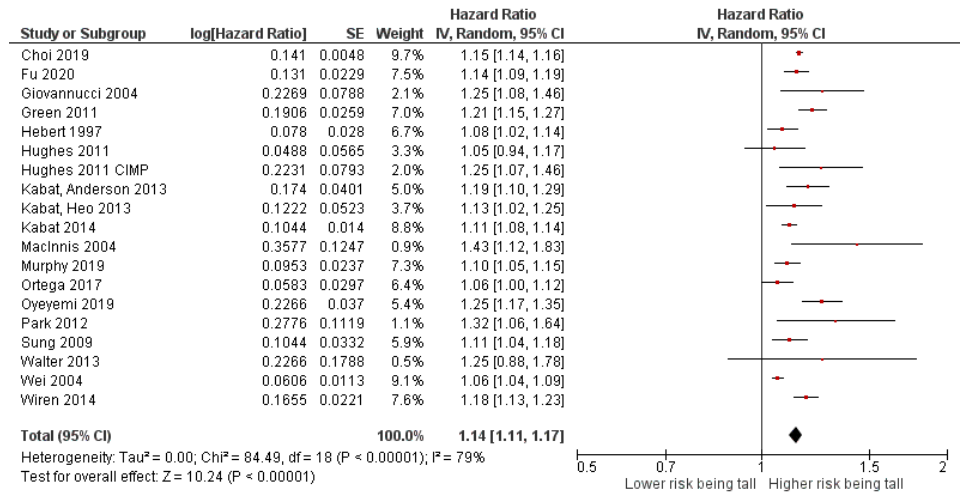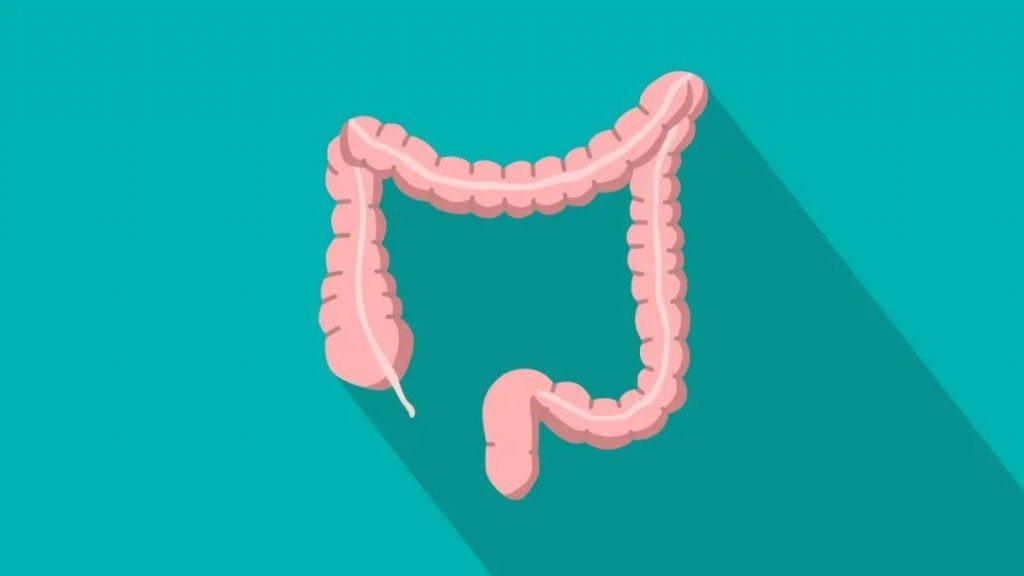
Height is a pain point in many people’s hearts. Some even try various methods to grow a few centimeters taller.
Recently, a Johns Hopkins University research team found that “short” is actually a health advantage – a lower risk of colorectal cancer or colorectal polyps.

For every 10 cm taller, the risk of colorectal cancer increases by 14%
In this study, the researchers analyzed data from 296000 people, including 280660 cases of colorectal cancer, 14139 cases of colorectal adenoma in 47 observational studies, and 1459 adults undergoing outpatient colonoscopy.

Incidence rate of incidence rate of colorectal cancer was increased by 10 centimeters per height in 33 out of 47 observational studies. 4 studies reported the incidence of 10 cm in height and colorectal adenoma incidence rate. 26 studies compared the incidence of colorectal cancer in the highest and lowest individuals.
Based on the above data, the researchers found that——
The risk of colorectal cancer was 24% higher in those with the highest height than in those with the lowest height;
Every 10 cm increase in height increases the risk of colorectal cancer by 14% and adenoma by 6%.

The researchers said that this is the largest study of its kind so far. It reminds us that height should be regarded as a risk factor for colorectal cancer screening during physical examination or disease screening.

As early as 2020, a study published in the British Journal of cancer reached a similar conclusion – in adults, height is associated with several cancer risks, and these associations are also related to gender:
In male population, height was positively correlated with the incidence of all-cause cancer, lung cancer, lymphatic cancer, blood cancer, non-Hodgkin lymphoma and melanoma;
In females, height is associated with breast cancer, melanoma, lymphatic cancer, non Hodgkin lymphoma and all cause cancer.
In terms of the incidence of all-cause cancer, the correlation degree of height in female group is higher than that in male group.
How does height affect health?
In addition to height and cancer risk, the impact of height on health has been found more and more in recent years.

Short men have the advantage of longevity
The University of Hawaii tracked more than 8000 people for 50 years and found that people with a length of 156 cm or less lived the longest.
Another Italian study found that people about 162 cm tall lived an average of two years longer than those taller.
Short people have a low risk of stroke
A study by the University of Tromso in Norway found that women with higher heart pumping distance, less blood flow and higher risk of stroke.
If a woman is less than 157 cm tall and has a normal weight, the risk of thrombosis is reduced by three times.
High risk of diabetes is low.
Researchers at the Finlandia University in East China investigated the health data of nearly 9000 men in Finland, and found that height was inversely proportional to the risk of type 2 diabetes and cerebrovascular diseases: insulin secretion and efficiency increased significantly as height increased.
However, there was no significant relationship between height and fasting blood glucose. Research suggests that short people may need to pay more attention to postprandial blood glucose.
Tall people have strong cognitive ability
Researchers from Helsinki University in Finland and Boston University in the United States measured the gray matter of cerebral cortex of 515 men with magnetic resonance imaging technology, and tested their language ability, mathematical ability, spatial ability and reasoning ability.
The results showed that the participants with higher stature achieved higher comprehensive scores. The researchers said that the taller people have a larger cerebral cortex surface area and their cognitive ability is enhanced by it.
Preventing colorectal cancer depends not only on height
Overall, height is only one of the many factors affecting health. We can reduce the risk of cancer through other aspects.
Compared with the “cunning” of many cancers, colon cancer appears “clumsy”. Most of its occurrence and development will go through the process of “small polyp adenomatous polyp precancerous lesion cancer”, which can last for up to 10 years.

If there is a family history of colorectal cancer, or long-term multiple intestinal polyps and ulcerative enteritis, they are all high-risk groups of colorectal cancer. Special attention should be paid to some symptoms, such as changes in defecation habits, changes in stool characteristics, frequent abdominal pain, lumps in the right middle and lower abdomen, anemia, etc.
Prevention and treatment of colorectal cancer should start with living habits and paying attention to physical examination:
Colonoscopy screening is recommended after the age of 45
It is recommended that people over 45 years old should have colonoscopy. If everything is normal, they can be rechecked after 3 ~ 5 years; If it is determined as a high-risk group, it should be checked after 1 ~ 2 years.
Avoid the “three high and one low” diet
“Three high and one low” diet structure, that is, high fat, high protein, high calories and low cellulose.
It is suggested to replace red meat with excessive animal oil with fish, poultry, lean meat and low-fat dairy products;
Replace fried food with boiled and steamed food;
Increase the intake of green leafy and root vegetables and fruits;
Pay attention to increasing the intake of cellulose, such as fungi, fresh beans and bamboo shoots;
Have more fresh food, less pickled and smoked food, and don’t eat moldy food.
Keep defecation unobstructed
There are a large number of dry faeces in the intestine of patients with long-term constipation, which can continuously stimulate the rectal mucosa and cause chronic inflammation, which may lead to intestinal polyps for a long time.
Patients with constipation can cultivate the habit of defecation by squatting regularly every day. For a long time, it will form a conditioned reflex, produce defecation intention at time, and there will be progressive peristalsis in the gastrointestinal tract.
In addition, it is best not to carry a mobile phone when going to the toilet. No matter squatting or defecating, the toilet time should not exceed 5 minutes, and people with constipation should not exceed 10 minutes.
Try to avoid being sedentary
Several studies have found that following a healthy lifestyle can reduce the risk of death from colon cancer by more than half, and exercise is the most evidence-based healthy lifestyle.
Change the sedentary state and get up and move for 2 ~ 3 minutes every 40 minutes. Exercise 3-5 times a week for at least 30 minutes each time. Jogging, swimming and brisk walking are all good ways.
Get enough water
It is suggested to form the habit of drinking a cup of warm water (300 ~ 500ml) in the morning. Adults should drink no less than 1500ml every day, which will help promote intestinal peristalsis.
Comments